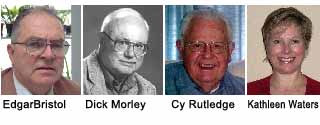無疑地,今年進入過程自動化名人館的入圍者,沒有人是在童年時代就想成為自動化英雄的。自動化行業是一個許多人剛剛涉足的行業,就像你們所將要看到的Dick Morley 和 Cy Rutledge。雖然如此,這些就任者的職業造詣,使他們分屬于一小類人,這一類人恰是對過程自動化做出了貢獻的人,并且在學科的技術和實踐方面都取得了顯著的差異。
更加無疑地,我們需要英雄,盡管是一個自動化工程師。尤其是現在,我們需要過程自動化領域的英雄,用以教導我們的孩子,對他們講來自制造自動化行業的受益。越來越少的孩子們對制造業感興趣,將其作為自己職業選擇的孩子也越來越少。不是所有的制造業都正在轉為離岸型,我們需要那些年輕人在若干年后成為自動化專業的棟梁之才。
Ed Bristol是Foxboro公司的名譽退休會員,事實上,他的實際身份與其現實身份是齊名的。從1959年11月起,他就已經協助Foxboro負責許多控制上的創新,這些創新是他近50年銷售商經驗所得。

目前,Bristol仍在工作未退休,作為Foxboro的內外部顧問。在伙伴Ted Williams(畢業于Purdue大學)的協助下,Ed在“工業計算機系統Purdue 工作車間”創造中,扮演領先角色。他還是一個著名作家,發表過100多篇論文,以及在控制、適應控制、多元控制、控制軟件和語言領域的十二項專利。
像Dick Morley一樣,,Bristol畢業于MIT。他是1965年RGA分析報告的創作者,此分析報告是今天多元控制的先兆。他還創造了今天廣泛應用的,基于適應性控制戰略的識別框架,尤其是在機器視覺中的應用。
Bristol也是一些像ISA、IEEE、AIChE、ACM專業協會的不倦的貢獻者,積極致力于標準撰寫近40年。在他其它的獎品中,最有說服力就是Dr. Guido Carlo-Stella獎,該獎是WBF于2004年授予Bristol的,作為其對BATCH理論貢獻和獲得WBF巨大成就的回報。
Bristol對許多過程自動化領域的重要貢獻之一就是其發表在ISA2002上的論文。 在個具有追溯意義的控制問題:我們應當做的是什么?論文的結論是:過程控制正處于困窘之中。數字化系統應使生活更簡易,繼而使其更堅實。依次地,數字化專家要開始勇敢地面對數字式復雜性結果。
Bristol繼續說:“傳統用戶/勞動力分工將重置實時過程領域。無論他是對是錯,Bristol對過程自動化領域的貢獻將繼續下去。
[font=times]
original text [/font]
[font=times]Real automation heroes! [/font]
[font=times][color=#708090]CERTAINLY, none of this year’s inductees into the Process Automation Hall of Fame decided as children that they wanted to be Automation Heroes. Automation is a career that most people just fall into, as you will see in the careers of Dick Morley and Cy Rutledge. Nonetheless, these inductees’ career accomplishments rank them in the small number of people, whose contributions to process automation have made significant differences in the art and practice of the discipline.
CERTAINLY,
We all need heroes, even automation engineers. Especially now, we need heroes in process automation that we can point children to when we talk about the benefits of careers in manufacturing and automation. Fewer and fewer children are interested in manufacturing as a career choice. Not all manufacturing is going to be off-shored, and we’ll need those young people in the years to come.
CONTROL is proud to present to you this year’s class of inductees into the Process Automation Hall of Fame. The induction will take place, once again, during the Hall of Fame dinner at the World Batch Forum (WBF) on March 5 at the Sheraton Gateway Hotel, near Atlanta’s Hartsfield-Jackson International Airport. You can get all the details at www.wbf.org. We invite all of CONTROL’s readers to attend, and to stay and attend WBF.
Ed Bristol is a Fellow Emeritus of the Foxboro Co. In fact, the fellowship he holds is eponymous—the Bristol Fellows are named after him. Since November 1959, he’s been associated with Foxboro, and is responsible for many of the control innovations that have emanated from that vendor for nearly 50 years.
Currently, Bristol is striving to avoid retirement, and working as a consultant, both inside Foxboro and outside. With fellow Hall of Famer Ted Williams, of Purdue University, Ed had a leading role in creating the “Purdue Workshop for Industrial Computer Systems” from which many continuous and batch process control techniques have come. He is a well-known author, who has well over 100 papers, and a dozen patents to his name in control, adaptive control, multivariable control, control software and languages.
Like fellow inductee, Dick Morley, Bristol is a graduate of MIT. He is the originator of relative gain array (RGA) analysis (1965), which is the forerunner of today’s multivariable control. He also originated pattern-recognition-based adaptive control strategies that are used widely today, especially in machine vision applications.
Bristol is a tireless contributor to professional societies like ISA, IEEE, AIChE, ACM and others, and has been active in standards writing efforts for nearly 40 years. Among his other awards, appropriately, is the Dr. Guido Carlo-Stella Award, which he received from WBF in 2004, for his seminal effort in getting WBF started and his contribution to batch theory.
One of Bristol’s most important recent contributions to the field of process automation is the paper he delivered at ISA2002 entitled, “A Control Retrospective: What We Should Have Done.” The conclusion of the paper says, “Process Control is in a quandary. The digital systems, which should make life easier, continue to make it harder. And at a time when digital expertise is beginning to face up to the consequences of digital complexity (sic).”
Bristol goes on to say, “A restoration of the traditional user/vendor division of labor would act to restore a real progress to the field.” Whether he is right or not, Bristol’s exemplary contribution to the field of process automation goes on. [/color][/font]
原文摘自:http://www.controlglobal.com/articles/2006/021.html
主編:
Walt Boyes
聲明:本文為中國傳動網獨家稿件,轉載請務必注明出處。
















 2025-06-25
2025-06-25
 2025-06-19
2025-06-19
 2025-06-13
2025-06-13
 2025-06-09
2025-06-09
 2025-06-05
2025-06-05
 2025-05-23
2025-05-23
 2025-05-21
2025-05-21
 2025-05-15
2025-05-15![]()
![]()
![]()
![]()





















 網站客服
網站客服 粵公網安備 44030402000946號
粵公網安備 44030402000946號